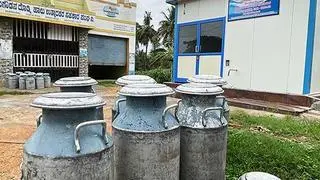After 17 days of striking work, the majority of the 10,000 or so workers at the Tata Tea-controlled Kanan Devan tea company returned to the plantations here on Thursday following a government-brokered agreement on a wage hike, in Thiruvananthapuram, on Wednesday evening.
Not satisfiedWhile most of the workers are happy that the strike has come to an end, they are not satisfied with the quantum of the wage hike — the organised trade unions had promised to secure double the current daily wage.
“The unions had said that they would get us ₹500 as daily wage instead of the current ₹232,” Kannakai (52), a tea-leaf plucker, told BusinessLine . “What they have got us is just ₹301 a day.”
The disappointment is obvious in the faces of the workers, while they are also relieved that the strike, which had begun on September 28, is over.
At the sixth round of talks over the past three weeks at the statutory Plantation Labour Committee on Wednesday, the managements and the recognised central trade unions in the plantation sector agreed on a package deal.
Accordingly, the workers in the tea plantations will get a Basic Daily Wage of ₹301 (this would mean a total daily wage of ₹436, including fringe benefits).
There was an understanding at the PLC negotiations that the productivity per worker would be raised from 21 kg tea leaves a day to 25 kg, but this has not officially been announced.
Slight increaseThe rubber workers’ Basic Wage has been increased from ₹317 to ₹381 (total wages will be ₹552), while that of cardamom plantation workers will go up to ₹330 (total wages ₹478), from the current ₹267.
The joint council of recognised central trade unions in the plantation sector — mostly tea, rubber and cardamom workers in corporate plantations — had gone on strike following the success of a nine-day strike by around 5,000 women workers at Kanan Devan Hills Plantations Private Limited last month demanding a bonus of 20 per cent.
The loosely-knit women’s collective, later known as Pompilai Orumai, had challenged the ‘trade union dictatorship’, which they alleged had colluded with the managements to deny them due benefits.
Threatened by the unprecedented unity of the non-unionised women workers’ success, the recognised unions, to up the ante, demanded ₹500 as the wage and launched an indefinite strike on September 28.
However, the trade unions, well aware that the industry cannot afford to double wages, finally agreed to a far lower wage on Wednesday evening and immediately announced that the strike was off.








Comments
Comments have to be in English, and in full sentences. They cannot be abusive or personal. Please abide by our community guidelines for posting your comments.
We have migrated to a new commenting platform. If you are already a registered user of TheHindu Businessline and logged in, you may continue to engage with our articles. If you do not have an account please register and login to post comments. Users can access their older comments by logging into their accounts on Vuukle.